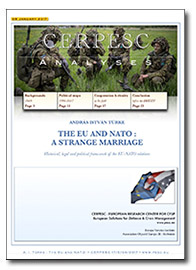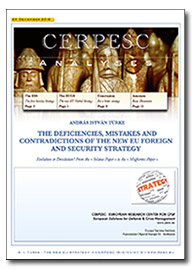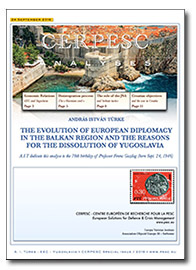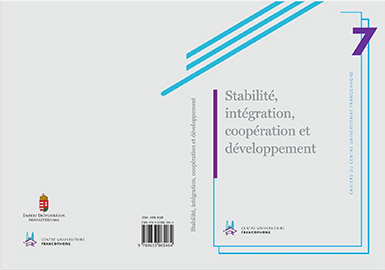You are here
Partnership with MTA

Hungarian Academy of Sciences / Bolyai Grant for Western Balkan Researches
Magyar Tudományos Akadémia - Bolyai János Kutatási Ösztöndíj
András István Türke : "The EU and the NATO : A strange marriage" In : Anna Molnar - Zoltan Galik (ed) : Regional and bilateral relations of the EU, Budapest:Nemzeti Közszolgalati Egyetem (will be published in 2018)
--
The EU and NATO : a strange marriage
Historical, legal, and political frameworks of EU-NATO relations
András István Türke
CERPESC 17/E/04/2017 - 09 January 2017
This analysis, beyond giving an outline of the historical, legal, and political frameworks of EU-NATO relations, is to draft by some examples that behind the scenes which fault lines make internal cooperation difficult, with a strong emphasis on French opinions, as a key state of European integration. With the reintegration of France and the considerable military decline of Europe, there are few left that could question the role of NATO in Europe. With BREXIT, the creation of a powerful and projectable European army will be much more difficult. Over the past three years, the range of subjects discussed between NATO and the EU has expanded considerably. Since the crisis in Ukraine, both organisations have regularly exchanged views on their decisions, especially with regard to Russia, and consultations have covered the Western Balkans, Libya, and the Middle East.
The Deficiencies, Mistakes and Contradictions of the New EU Foreign and Security Strategy
Evolution or Devolution? From the « Solana Paper » to the « Mogherini Paper »
András István Türke
CERPESC 16/E/3/2016 - 20 December 2016
The events of the last 20 years, the first operations and missions, show that the Common Security and Defense Policy, the CSDP (the European Security and Defense Policy: the ESDP, before 2009) does not exist only on paper. Europe must act to prevent wars and crises or to stop them. The European Union and its member countries are confronted with decisive choices for the future of Europe as a political entity. The external (and above all, energy) dependence of the Union is particularly emphasized by the European security strategies. The documents that function as strategies (the first, the 2003 ESS and the most recent, 2016 EUGS) of the European Union are quite poor in terms of content and objectives. They list the challenges, without drafting the places and means of the overall strategic presence. The purpose of this analysis is to examine the major development issues of EU strategic thinking during the period 2003-2016. Can we talk about development, stagnation, or devolution? Is the new strategy capable of fulfilling its role and can really serve as the basis of our ambitions?
The Evolution of European Diplomacy in the Balkan Region and the Reasons for the Dissolution of Yugoslavia
András István Türke
A.I.T dedicate this analyse to the 70th birthday of Professor Ferenc Gazdag (born Sept. 24, 1946)
CERPESC Special issue / 2016 - 24 September 2016
After the rupture with Stalin in 1948 Tito's Yugoslavia did not become a member of the Warsaw Pact and chose a policy of non-alignment. Shortly after the birth of the European Economic Community, relations between Yugoslavia and the Federal Republic of Germany became rather tense because of the Hallstein doctrine.
On 19 March 1970, official relations between the EEC and Yugoslavia began with the initial non-preferential agreement signed in Brussels. Since 1977, the Community has assisted Yugoslavia in accessing the resources of the European Investment Bank.
The disintegration of the Socialist Federal Republic of Yugoslavia began with the reintensification of internal crises in the 1980s. The SFRY was divided into six republics: Serbia, Montenegro, Croatia, Slovenia, Macedonia and Bosnia-Herzegovina (BiH) and two autonomous territories, Vojvodina and Kosovo.
In 1981, the first phenomena of crisis emerged in Kosovo, which was the only territory of the federation where the South Slavs were in a minority. In Kosovo, the Albanian population has multiplied much more rapidly than other nations since 1960...
András István Türke
L`Union européenne et sa stratégie de rétablissement de la paix en Afrique (In: A. I. Türke (ed.) Stabilité, intégration, coopération et développement, pp. 67-86.)








